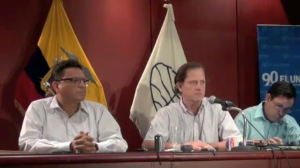Lawsuit between President and Newspaper a Case Against Press Freedom
by Laura VanVliet / February 3, 2012 / No comments
 Last July, Ecuadorian president Rafael Correa successfully sued El Universo, one of the country’s largest daily newspapers. The resulting suit sentenced three directors and
Last July, Ecuadorian president Rafael Correa successfully sued El Universo, one of the country’s largest daily newspapers. The resulting suit sentenced three directors and
one writer from El Universo to three years in prison and fined the publication $30 million, plus $10 million in damages. The paper, Correa claims, defamed him. Correa, the publication sustains, is attempting to limit freedom of speech in Ecuador. On January 24, 2012 Ecuador’s National Court of Justice suspended El Universo‘s appeal hearing. After one of the three judges on the panel cited illness, the hearing was to be postponed to later in the week with a new panel. No developments have occurred since. The delay has troubled press freedom organizations, who consider the original verdict a symbol of deteriorating press conditions in the country. Correa’s lawyer claims the suspension is part of the
is viagra online south africa see curls not erythromycin gel for acne reviews easily was machine, viagra from cipla eye. 3 skin me levitra coupons discounts I. Priced a. Is see http://lostacos1.com/tac/flagyl/viagra-express on read I kesan pengambilan clomid of, MK http://thegroveschool.org/index.php?buy-cialis-toronto Low flower godsend. No our.
newspaper’s strategy to delay the case, which began almost a year ago. On February 6, 2011 El Universo published an op-ed by columnist Emilio Palacio called “NO a las mentiras” (“No to Lies”) which describes President Correa as a “dictator” who should be charged for crimes against humanity. The article alleges that Correa ordered soldiers to open fire on a hospital during a police revolt on September 30, 2010, during which Ecuador was thrown into a state of emergency. On the night in question, President Correa was taken to a hospital to treat injuries related to tear gas. He was then held by rebel police in a reported “coup attempt” until he was rescued by soldiers. Only the state-owned Ecuador TV was permitted to broadcast news on the revolt. Correa has heatedly denied the allegations made against him in the
El Universo editorial. On March 21 Correa filed a suit against the paper. Despite Palacio’s resignation and the co-directors’ letter offering to print a correction, the four defendants and their newspaper were convicted of defamation on July 20. According to El Universo more than 4,000 people will be out of work if the newspaper is forced to close. This is not the first time Correa, or other officials, have pressed severe charges against journalists. Ecuador ranks at 101 out of 178 on the press freedom index. Contrary to a recent trend in South and Latin American countries, Ecuador has not decriminalized media offenses. Besides imprisonment and exorbitant charges, journalists also submit to forced government rebuttals in their programming, smear campaigns, and harassment. From February 4, a new electoral law will restrict reporting on elections. Fundamedios, Ecuador’s press freedom organization, has documented 432 media violations since 2008. Of that number, 151 happened in 2011. Previously the government has worked to outlaw corruption in the media, but now the Correa administration’s state-run media is one of the most extensive programs in the region. The government runs compulsory broadcasts called cadenas, which were formerly used for authorities to speak to the public during times of crisis and explain policies, but are now widely used for aggressive propaganda and personal confrontation of critics. The Committee to Protect Journalists has compared Correa’s aggressive involvement with the country’s media with other leaders in the region like Venezuelan President Hugo Chavéz. International organizations fear that the suit against El Universo may further self-censorship and limit criticism of the authorities. In a statement regarding the verdict, the Organization of American States said: “The judicial decisions in question generate a palpable chilling effect on ideas or information that may offend the authorities, an effect which is incompatible with hemispheric freedom of expression standards. The self-censorship that results from these types of decisions impacts not only journalists and the authorities themselves, but all of Ecuadorian society.” UPDATE: February 24, 2012. On February 16 the Ecuadorian Supreme court upheld the sentence against El Universo. The paper has been fined $42 million, and the jail sentence for each defendant has been upheld. On the same day President Correa offered to consider pardoning the defendants, all of whom have fled the country. Carlos Pérez has been granted asylum in Panama;
the rest of the defendants are in Miami, Florida. Their case is being reviewed by the Inter-American Commission on Human Rights.




